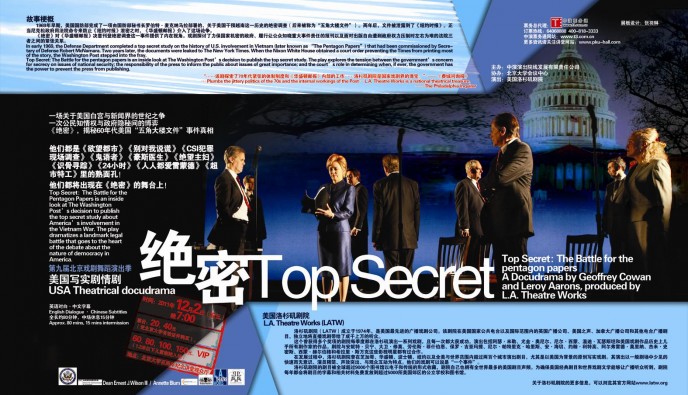
The Production
Based on interviews and trial transcripts, Top Secret tells the inside story of the Washington Post’s 1971 decision to publish the pentagon papers. The play recently concluded a 10-day, 3-city tour in China. Read More


Based on interviews and trial transcripts, Top Secret tells the inside story of the Washington Post’s 1971 decision to publish the pentagon papers. The play recently concluded a 10-day, 3-city tour in China. Read More
NPR’s Margot Adler filed this report on the current New York Theatre Workshop production of Top Secret: The Battle for the Pentagon Papers. Download the audio here.
Adler quotes from the March 3, 2010 post-show discussion with David Rudenstine, Todd Gitlin, and Steve Wasserman, in which these scholars contrasted the historical context in which the play takes place with the different political climate that exists today.
Video of Sen. Mike Gravel Reading the Pentagon Papers into the Senate Record
Thanks to Cputer for the heads up!
The Stanford Law Review‘s January 2010 issue includes Deep Secrecy, 62 Stan. L. Rev. 257 (2010), an article by recent Yale Law School grad David Pozen that proposes a new theoretical framework for understanding government secrets (pdf of article; earlier article draft on SSRN).
According to the Review’s abstract:
This Article offers a new way of thinking and talking about government secrecy. In the vast literature on the topic, little attention has been paid to the structure of government secrets, as distinct from their substance or function. Yet these secrets differ systematically depending on how many people know of their existence, what sorts of people know, how much they know, and how soon they know. When a small group of similarly situated officials conceals from outsiders the fact that it is concealing something, the result is a deep secret. When members of the general public understand they are being denied particular items of information, the result is a shallow secret. Every act of state secrecy can be located on a continuum ranging between these two poles.
After tracing some of the existing constituional, structural, and theoretical analyses of government secrets, Pozen applies his new framework to point out that the deeper a secret, the smaller the group of people (and possibly dissenting views) available to deliberate about it. Pozen notes that government can still keep the substance of some government actions as “shallow secrets” while allowing additional debate and deliberation, concluding that:
Even among the subset of government secrets about which the public knows nothing . . . the comparative insularity of the deeper secrets can pose a special threat to good governance, to liberal democratic values, even to the Constitution. We cannot and should not seek to prevent the executive branch from keeping secrets. We can and should seek to have them kept as shallow as possible.
Along the way, Pozen evaluates a number of the secrets kept by the Bush administration, including many that are discussed elsewhere on this website. For Pozen’s take on the Pentagon Papers era, see p. 292 of the article where he describes the Vietnam and Watergate era as one of the first times in American history where scholars began to see the government’s asserted need for secrecy as implicating constitutional values.
Nate Jones at the National Security Archive Blog just put up this post that includes the audio of the June 14, 1971 tape from President Nixon’s White House recording system in which Nixon responds to the New York Times‘s publication of the Pentagon Papers.
Included in this tape is H.R. Haldeman’s memorable quote – a quote that is included in Top Secret: The Battle for the Pentagon Papers, in which Haldeman notes that even though the content of the Pentagon Papers may be “gobbledygook” to the public
. . . out of the gobbledygook comes a very clear thing: You can’t trust the government; you can’t believe what they say; and you can’t rely on their judgment. And the implicit infallibility of presidents, which has been an accepted thing in America, is badly hurt by this, because it shows that people do things the president wants [them] to do even though it’s wrong. And the president can be wrong.
Jones notes that
In time for Sunshine Week, the 2010 Oscar-nominated documentary “The Most Dangerous Man in America†(which relied upon National Security Archive documents) has re-raised the issues of government secrecy, national security, and which types of information the American public has the right to know.
We’d add that Top Secret: The Battle for the Pentagon Papers does the same.